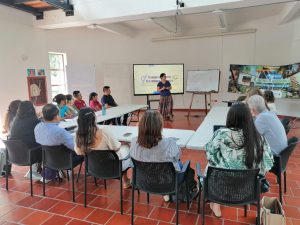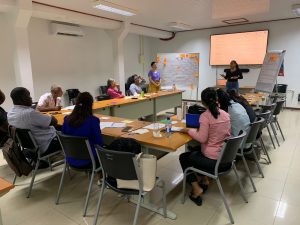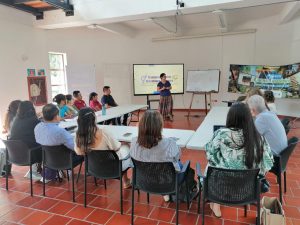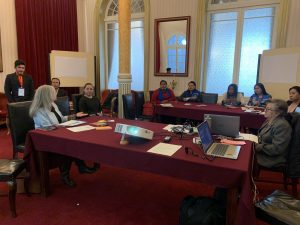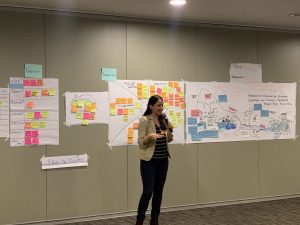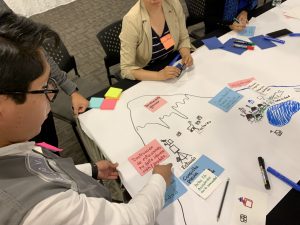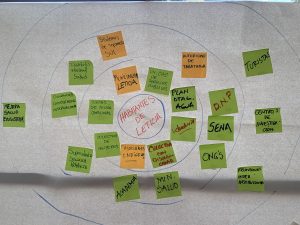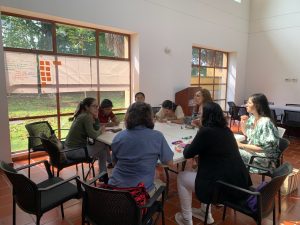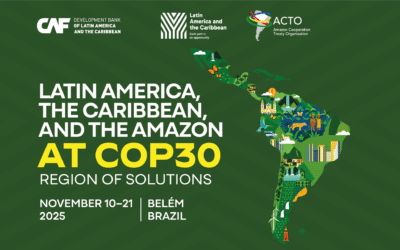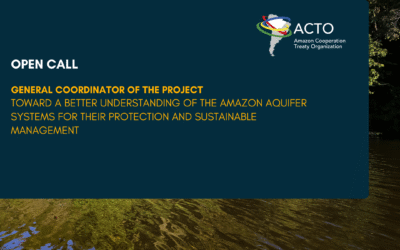Since August, gender training has been taking place in all the Amazon countries, as part of the project to implement the Strategic Action Program (SAP) for the integrated and sustainable management of the Amazon Basin, carried out by ACTO.
Taking into account the fundamental role of women in environmental management and the importance of their equal participation in decision-making related to water resource management, the training sessions are increasing the countries’ capacity to plan, monitor and evaluate the incorporation of gender issues in the implementation of the SAP, as well as to deepen regional cooperation in this field.
Participants are professionals working in the field of Integrated Water Resources Management (IWRM) and other national actors interested in learning about gender mainstreaming and being able to effectively incorporate it into projects, programs and policies.
The skills acquired in the training will enable them to work to promote and establish gender equity, contributing to men and women having equal access to and control over natural resources, the substantive participation of women in the governance of these resources and the equitable distribution of socio-economic benefits.
Women and water
Women’s participation in water management takes place above all in the context of the care economy. Whether in the area of human consumption, where they are responsible for personal and domestic hygiene, or in the production of food, medicines and fibers, they collect, store and manage water in an exemplary way. They use it rationally and efficiently, recycle it and try to protect it from pollution.
This management capacity of women has a positive impact on agriculture, the most water-dependent economic activity, which uses 70% of all the water consumed in the world for irrigation. According to UN Women, despite having less access to resources – land, seeds, training and new technologies – and less control over their time, being excluded from decision-making processes and suffering gender-based violence, their productive strength ensures that family farming and the cultivation of basic products have more sustainable irrigation systems.
Considering that women are responsible for half of the world’s food production and represent, on average, 43% of the agricultural workforce in developing countries, according to 2018 data from the Food and Agriculture Organization of the United Nations – FAO, what would be achieved if they had guaranteed access to resources and knowledge and were consulted on infrastructure issues or water management policies?
According to projections by the Economic Commission for Latin America and the Caribbean (ECLAC), income from family and peasant production would increase by an average of 25%, agricultural production would grow by between 2.5% and 4% and hunger would be reduced by between 12% and 17% in Latin American countries.
Training methodology
The training offers participants theoretical and practical methodologies and tools aimed at incorporating a gender perspective into SAP actions, with the necessary cross-cutting approach and throughout the cycle of each project.
“The facilitation methodology I use is based on transformative dialogue centered on action-reflection-action and learning by doing. During the practical exercises, I encourage the groups to work collaboratively, applying the tools presented to a concrete case and considering all the phases of a project, from diagnosis/analysis to monitoring/evaluation. At the end of the exercise, a representative from each group presents the results to all the participants,” explains Sara María Gómez Rivera, Gender Equity specialist and facilitator of the training.
The main premise conveyed in the training sessions is that, in order to integrate the gender perspective into policies, plans, programs and projects, it is necessary to work in a participatory manner, involving various actors, including, above all, the beneficiaries, with special attention to listening to the voice of women, their needs, dreams and opinions, allowing projects to be co-constructed and co-implemented in the territory with various actors, which will increase their chances of success.
- Gender training during the National SAP Implementation Workshop in Lima, Peru
- Gender training during the National SAP Implementation Workshop in Leticia, Colombia
- Gender training during the National SAP Implementation Workshop in Paramaribo, Suriname
Gender Scanner
The central tool of the training is the Gender Mainstreaming Scanner, developed by ECLAC and the German Agency for International Cooperation (GIZ) in 2021. The Scanner can be applied tactically in the different phases of plans, programs and projects, such as diagnosis/analysis, formulation/design, implementation/execution and monitoring/evaluation.
This tool provides an overview of the project in terms of its gender approach and makes it possible to identify whether it is gender-blind, gender-limited or gender-sensitive and even gender-transformative.
The training also introduces social innovation tools that work at the operational level – for example, Design Thinking and Kanban Board – and can be used to integrate gender into each project cycle.
Gender equality group
The different audiences from the completed training sessions are coming together to form a gender equality group within the structure of the ACTO Amazon Basin Project. This newly created collaborative ecosystem is an important instance in the process of consolidating gender mainstreaming in the SAP’s actions.
The gender group, which will be joined not only by participants in the upcoming workshops but also by new stakeholders, will enable mutual support in the implementation of IWRM plans, projects, policies and programs through the exchange of experiences, information and opinions.
It will be a space for integration, a driving force for new initiatives, open to participation and feedback, from which it will be possible to move forward in promoting gender equity in the implementation of the SAP and the sustainability of water resources in the Amazon Region and increase the resilience of its populations in the face of climate change.










